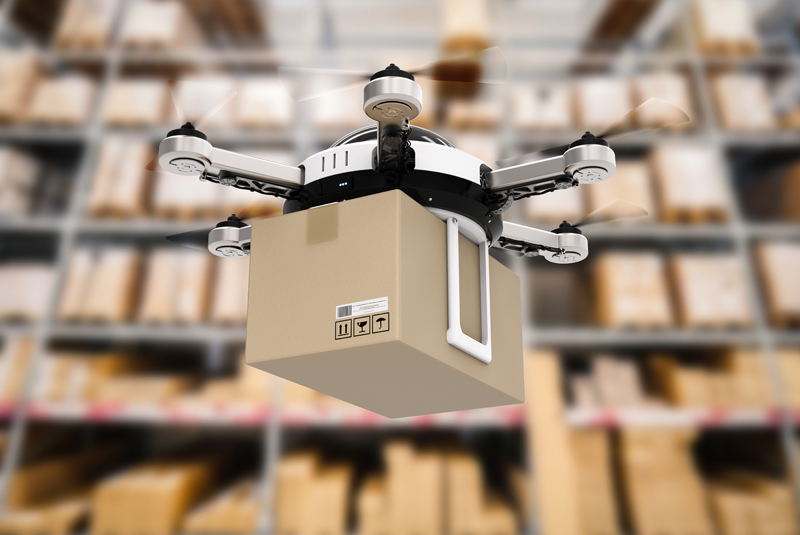
Connected technology has the potential to transform the builders’ merchant sector, explains Nick Hull, BisTrack Customer Account Manager at Epicor Software UK and Ireland.
Recent findings from the MIT Centre for Business show companies that have embraced digital transformation are 26% more profitable than their average industry competitors and have a 12% higher market valuation. Growth and profitability is a key driver for the adoption of connected technology including robots, drones, voice-enabled technology, artificial intelligence (AI), and biometric security systems.
These technologies are already being installed and used in factories which serve the construction supply chain. For instance, in the Netherlands, Boers & Co Fine Metalworking Group is in the process of trialling Industry 4.0 initiatives in their manufacturing facilities.
The company is using ‘PAUL’, a Radio Frequency Identification (RFID) cycle counting drone. Cycle counting inventory is a laborious and repetitive task, and as such is ripe for human error. PAUL automates the task and transmits the results directly to the CEO’s mobile phone. It is not beyond the realms of possibility that in years to come, drones like PAUL may help merchants manage their warehouses and deliveries.
Sensor technology is also transforming customers’ interactions with traditional shops and distribution outlets and perhaps unsurprisingly, Amazon has been at the forefront of this innovation. In Seattle, the online retail giant has opened Amazon Go, a completely cashier-less grocery store.
There are not even any self-service checkout stands. Rather, customers use a smartphone app to enter, then through a combination of regular and infrared cameras, computer-vision algorithms, and machine learning, the store “knows” what they have chosen. The customer simply leaves with their products and their credit card is billed.
Could Amazon Go be a model for builders’ merchants? In a world where processors are embedded in almost everything, this might not be far-fetched. A merchant’s customers might enter the yard, select what they need — from tools to timber — and leave, with the processor embedded in the item or its packaging billing them accordingly.
Future fit
To get fit for an automated future, builders’ merchants can already today work with enterprise resource planning (ERP) software solutions, such as Epicor BisTrack, to integrate all parts of their business. In just the last five years, ERP solutions have gone from what were typically seen as simple order entry systems to crucial business applications that touch and often manage the entire merchant business.
Epicor BisTrack Advanced Stock Management, for instance, allows real time picking and stock control. Staff in a warehouse or yard are issued with rugged handheld devices, which scan barcodes of stock, thus enabling accurate stock level monitoring. The data is shared with other departments in real time, which means sales and transport/delivery teams have up-to-date visibility of each and every transaction.
Sales teams will always know what products are in stock and what are not, what customers have ordered previously and what stage an order is at present. The software also allows for the monitoring of the performance of picking teams, as all tasks are recorded against the user and the times tasks are carried out are logged.
The Epicor BisTrack suite of software is developed on the familiar Windows format and thus is intuitive and easy to learn. It can manage sales, control stock, simplify purchasing, and gather intelligence on all aspects of the business. In an increasingly fast-paced and interconnected world these benefits help maximise efficiency and drive productivity to support a company’s growth strategies.
Early pioneers such as Amazon Go in retail and Boers in engineering and high-spec manufacturing, are already embracing cutting-edge technology and reaping the benefits. Builders’ merchants are likely to see similar advantages in the not too distant future. ERP software can help you on that journey, and boost your plans to grow your business.
Five steps to preparing for digital transformation
Align your business transformation strategy to your business goals
Start by assessing your overall business goals and ask what objectives your business wants to achieve in the short, medium, and long-term. Then ask what technology will help achieve those goals. For example, it might be that your primary focus is to expand into new markets quickly, in which case it might be sensible to hold off on that AI investment you’ve been planning, and instead make sure you have a solid cloud infrastructure that can support your mission-critical processes from multiple locations.
Invest in the right technologies
Digital transformation means different things to different businesses and certainly, heavy spending alone is not going to guarantee success. The Aberdeen Group has identified three digitalisation technologies that have the potential to impact operations — the Internet of Things (IoT) because of its ability to provide operational intelligence, the cloud for its scalability, and big data analytics, which can transform data into predictive and actionable insights.
Ensure buy-in from key stakeholders within your business
Helping them understand the reason for the business’s investment will make it easier to overcome any potential resistance to new processes. This is particularly important when digital technologies are being implemented to automate tasks that are otherwise completed by staff members, or when it might not be immediately obvious how an investment will deliver Return on Investment (ROI).
Turn insight into action
The Epicor BisTrack solution can provide businesses with crucial information about customer trends and predictions, or information about how products are performing. Some businesses are already using this sort of data to turn insights into action.
Continually reassess your digital strategy
New technologies are being launched all the time — from robots that complete tasks on the production line quicker than humans, to machines that can fix equipment problems without intervention. Understand that digital transformation is a journey that is never complete.









